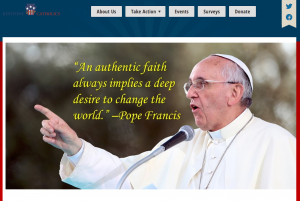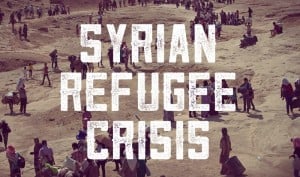 As Philadelphia prepares for the Pope’s visit and the World Meeting of Families, one would expect to see a program aimed at addressing the Church’s plan to be more pastoral toward gay, lesbian, and transgender people. In a recent Philadelphia Inquirer article, the only mention of such efforts to be expected during the World Meeting of Families was about a celibate man who is gay. That’s it. Not exactly a wide-ranging discussion on the contours of modern life and the family.
As Philadelphia prepares for the Pope’s visit and the World Meeting of Families, one would expect to see a program aimed at addressing the Church’s plan to be more pastoral toward gay, lesbian, and transgender people. In a recent Philadelphia Inquirer article, the only mention of such efforts to be expected during the World Meeting of Families was about a celibate man who is gay. That’s it. Not exactly a wide-ranging discussion on the contours of modern life and the family.
By June of this year, the Supreme Court of the United States may finally resolve the issue of same-sex marriage for the entire nation. Depending on the ruling, it’s likely that an increasing number of Catholic institutions (schools and hospitals, in particular) will have to make difficult policy decisions on issues such as granting benefits to same-sex couples. Many Catholics institutions will cite religious freedom or tradition to legitimize the denial of coverage to gay and lesbian couples. Others will try to make distinctions between fair and unfair discrimination, arguing that such a denial would be a morally licit form of discrimination.
For Catholics that cite long-standing rules as a reason to reject any recognition of same sex civil marriages or changes in pastoral care, it must be remembered that the Church has come to terms with changes to civil marriage in the past without altering its teaching. The Church’s reaction to the legalization of divorce and the widespread occurrence of cohabitation are two examples. It has not been uncommon for the Church to recognize the need to provide couples with both basic necessities, such as health insurance, and pastoral care, even if it disagrees with the nature of their relationships.
While the World Meeting of Families may very well come up short when it comes to addressing greater pastoral care and rights of gay, lesbians, and transgender people, individual Catholics and institutions seem to be stepping up to the challenge. Some in the Church, including the hierarchy, have begun to ask if we might be able to find some positives in same-sex relationships. Bishop Robert Lynch of St. Petersburg recently said, “I do not wish to lend our voice to notions which might suggest that same-sex couples are a threat incapable of sharing relationships marked by love and holiness and, thus, incapable of contributing to the edification of both the church and the wider society.” Bishop Johan Bonny of Antwerp recently indicated that gay and lesbian couples should be more widely accepted in both society and the Church in a statement that Fr. James Martin called “quite revolutionary.”
At the same time, some Catholic institutions have already taken steps to provide equal treatment to gay and lesbian couples. One example is Mercy Health, one of the largest Catholic healthcare systems in the United States, which recently announced that it will extend benefits to all legally married same-sex spouses this spring. Last year in Nebraska, a state in which same-sex marriage has not been legalized, the president of a Jesuit University, Creighton, decided to recognize the spouses of employees who wed in states where same-sex marriage is legal. Now same-sex and heterosexual couples at the university have equal health benefits.
At a recent Vatican summit, Cardinal Lorenzo Baldisseri of Italy reportedly told participants that if the aim of the synod last October was to simply repeat established Church teachings, then it was “senseless” to even have the meeting. Cardinal Baldisseri also reportedly told those assembled that they shouldn’t be “shocked” by theologians questioning Church teachings on marriage and family life. Pope Francis wants real discussion and debate.
All Catholics should have the opportunity to openly state their case on these issues without fear of persecution or punishment. Sadly, such an atmosphere does not widely exist. Individuals and institutions that desire to provide greater pastoral care and rights to gay, lesbian, and transgender people and their families too often fear a backlash that might threaten the other important work that they do. No one should have to fear reaching out to the marginalized or ensuring that everyone has access to healthcare. In Evangellii Gaudium, Pope Francis states, “Neither the Pope nor the Church have a monopoly on the interpretation of social realities or the proposal of solutions to contemporary problems.” Open dialogue is needed.
Finally, fixing the Church’s approach to gay, lesbian, and transgender people is essential when it comes to responding to the concerns of millennials. In a recent National Catholic Reporter article, it was reported that Fr. Peter Daly sat down with about 40 young Catholic adults and asked them why their age group is turning away from the church. The number one reason provided by the group was the Church’s treatment of LGBT people. This seems to reflect the data on millennials and millennial Catholics. The Pew Research Center found that 85% of young Catholics between the ages of 18 to 29 believe gays and lesbians should be accepted by society.
When millennial Catholics see friends and family members who feel isolated and unwelcome because of their sexual orientation, they too feel alienated. And when necessities like healthcare are denied, they often think the Church is being unjust. They see the Church as embracing a narrow commitment to man-made rules and traditions rather than a more loving, compassionate approach. Pope Francis understands that Catholics everywhere are living, breathing testaments to God’s uncompromising love. We must have a real discussion about how that love translates into welcoming gay, lesbian, and transgender people into our communities. As Archbishop Edoardo Menichelli recently said, “Every person is a gift from God, no matter their sexual inclinations. Heterosexuals, gays, everybody has a lot to offer. We have to rediscover this in the Gospel and in our everyday mission.”
Stephen Seufert is the State Director of Keystone Catholics, a new social justice advocacy organization in Pennsylvania dedicated to promoting the common good. (This opinion is reposted with permission from Keystone Catholics.)











